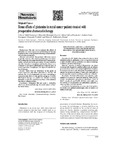Mostrar o rexistro simple do ítem
Tissue effects of glutamine in rectal cancer patients treated with preoperative chemoradiotherapy
| dc.contributor.author | Vidal-Casariego, Alfonso | |
| dc.contributor.author | Hernando-Martín, Mercedes | |
| dc.contributor.author | Calleja-Fernández, Alicia | |
| dc.contributor.author | Cano-Rodríguez, Isidoro | |
| dc.contributor.author | Cordido, Fernando | |
| dc.contributor.author | Ballesteros-Pomar, María D. | |
| dc.date.accessioned | 2015-06-23T07:56:25Z | |
| dc.date.available | 2015-06-23T07:56:25Z | |
| dc.date.issued | 2015 | |
| dc.identifier.citation | Vidal-Casariego A, Hernando-Martín M, Calleja-Fernández A, Cano-Rodríguez I, Cordido F, Ballesteros-Pomar D. Tissue effects of glutamine in rectal cancer patients treated with preoperative chemoradiotherapy. Nutr Hosp. 2015;31(4):1689-1692 | es_ES |
| dc.identifier.uri | http://hdl.handle.net/2183/14718 | |
| dc.description.abstract | [Abstract] Background: The aim was to evaluate the effects of glutamine on tumor regression and histological damage in patients with rectal patients following chemoradiotherapy previous to surgery. Material and methods: Ten patients with rectal cancer surgically removed after chemoradiotherapy were included, a subgroup of a randomized trial that compared glutamine and placebo in the prevention of acute radiation enteritis. Samples of neoplasm and healthy tissue were evaluated by an expert pathologist searching for signs of tumor regression, muciphages, and signs of radiation-induced damage. Results: There were no differences in the grade of tumor regression with either glutamine or placebo. All patients who received glutamine presented muciphages, compared with 28.6% of the placebo group (p = 0.038). Histological damage was similar in patients receiving glutamine or placebo, and between those with radiation enteritis or without toxicity. Conclusion: Glutamine did not exert a protective effect over chemoradiotherapy in rectal cancer or healthy rectal tissue. | es_ES |
| dc.description.abstract | [Resumen] Introducción: El objetivo fue evaluar los efectos de la administración de glutamina sobre la regresión tumoral y sobre el tejido sano en pacientes con cáncer rectal que recibieron quimiorradioterapia. Material y métodos: Se incluyó 10 pacientes con cáncer rectal operado después de quimiorradioterapia, un subgrupo de un ensayo clínico que comparó glutamina con placebo en la prevención de enteritis aguda. Un patólogo experto analizó las muestras de tumor y tejido sano, buscando datos de regresión tumoral, mucífagos y daño por radiación. Resultados: No hubo diferencias entre placebo y glutamina en el grado de regresión tumoral. Todos los pacientes con glutamina presentaron mucífagos, frente al 28,6% con placebo (p = 0,038). El daño sobre tejido sano fue similar en los pacientes con glutamina y placebo, y entre aquellos con y sin enteritis. Conclusión: La glutamina no ejerce un efecto protector frente a la quimiorradioterapia sobre el tumor o el tejido rectal sano. | es_ES |
| dc.language.iso | eng | es_ES |
| dc.publisher | SENPE (Sociedad Española de Nutrición Parentelar y Entelar) | es_ES |
| dc.relation.uri | http://dx.doi.org/10.3305%2Fnh.2015.31.4.8521 | es_ES |
| dc.rights | Reconocimiento 4.0 Internacional | |
| dc.rights.uri | http://creativecommons.org/licenses/by/4.0/ | |
| dc.subject | Glutamine | es_ES |
| dc.subject | Chemoradiotherapy | es_ES |
| dc.subject | Enterins | es_ES |
| dc.subject | Muciphages | es_ES |
| dc.subject | Glutamina | es_ES |
| dc.subject | Quimiorradioterapia | es_ES |
| dc.subject | Enteritis | es_ES |
| dc.subject | Mucífagos | es_ES |
| dc.title | Tissue effects of glutamine in rectal cancer patients treated with preoperative chemoradiotherapy | es_ES |
| dc.title.alternative | Efectos tisulares de la glutamina en pacientes con cáncer de recto tratados con quimorradioterapia preoperatoria | es_ES |
| dc.type | info:eu-repo/semantics/article | es_ES |
| dc.type | info:eu-repo/semantics/publishedVersion | es_ES |
| dc.rights.access | info:eu-repo/semantics/openAccess | es_ES |
Ficheiros no ítem
Este ítem aparece na(s) seguinte(s) colección(s)
-
GI-FENM - Artigos [106]






